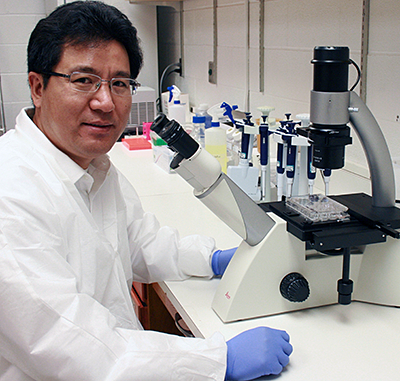
The journey Dr. Jianqiang Zhang has taken to his present position in the Veterinary Diagnostic Laboratory has been anything but a straight line.
Zhang, an assistant professor in veterinary diagnostic and production animal medicine, is a diagnostic virologist with a focus on swine medicine. But it wasn’t always that simple.
A graduate of Beijing Medical University, Zhang studied preventive medicine human health but he had no plans to become a physician. Research was his forte and after getting a master’s in molecular virology and immunology, he traveled to the University of Kentucky to work on his PhD in veterinary virology.
For the next 10 years, Zhang actively participated in the field investigational and diagnostic services provided by the World Organization for Animal Health (OIE) designated Equine Viral Arteritis Reference Laboratory.
Upon his move to Iowa State University in 2010 and becoming a tenure-track faculty member two years later, Zhang switched from equine to swine. He says that leap isn’t as big as most people would think.
“The methodology to study viruses is very similar between human and animal viruses and also between swine and equine viruses,” he said.
That easy transition has led Zhang to numerous research projects and recognition. He has published 59 peer-reviewed articles, including 22 as the lead author; written three book chapters; and secured $3.5 million in funding as principal investigator, co-principal investigator or co-investigator. He has one U.S. patent, one pending patent and five intellectual property disclosures filed to the ISU Research Foundation.
This fall, Iowa State will recognize Zhang’s prowess as a researcher by awarding him with the ISU Award for Early Achievement in Research, the first College of Veterinary Medicine faculty member to receive the award since it was instituted in 1990. This award comes on the heels of his receiving the 2015 College of Veterinary Medicine’s Award for Early Achievement in Research. Zhang also received the 2016 Zoetis Award for Veterinary Research Excellence.
And he has accomplished these feats despite that his current position description includes only 15% of his time devoted to research.
“I love research,” he said, “and in addition to my professional diagnostic service and other duties, I have devoted my time including weekends and nights to research.”
His work in the diagnostic lab drives his research efforts as he fills in gaps of knowledge in the caseload received by the VDL.
“It is a perfect combination of doing diagnostic work and research,” he said. “My work in the diagnostic lab brings about many, many questions – questions that the swine industry and veterinarians want answers for.
“Finding the answers to these questions are what has interested me and I have been able to develop my research efforts around the questions I find in the diagnostic lab. I see a knowledge gap and then set out to get funding to fill in that gap.”
Zhang’s research experience involves various aspects of viruses. These include virus diagnostic assay development and validation, investigational disease outbreaks and molecular characterization of viruses, virus-host cell interactions, application of reverse genetics system in the study of virus pathogenesis, and vaccine development.
His research has had a major impact on Iowa, U.S. and global animal health. Specifically, he has worked on the new emerging viruses (porcine epidemic diarrhea virus, porcine delta coronavirus, Senecavirus), zoonotic viruses (influenza) and viruses with significant economic impact (highly pathogenic avian influenza, porcine reproductive and respiratory syndromevirus) on the nation’s livestock and poultry industries.
August 2016
